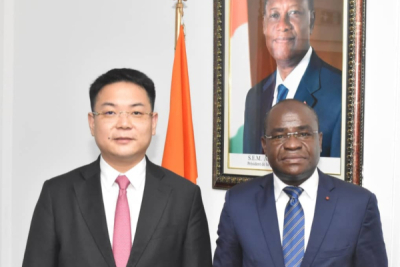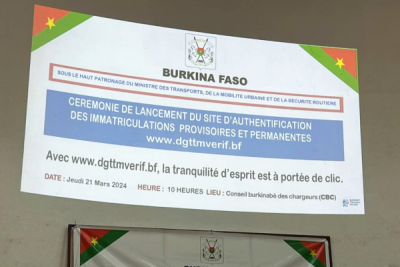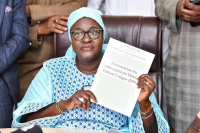
Tech (807)
During the tenure of Macky Sall, which commenced in 2012, the digital sector emerged as a crucial catalyst for the acceleration and socio-economic development of the country. His successor aims to exceed these accomplishments in the next five years.
Senegal’s newly elected President, Bassirou Diomaye Faye (photo), has outlined plans to accelerate the country’s digital transformation, a process initiated by his predecessor, Macky Sall. Faye, who was elected on Sunday, March 24, sees digital technology as a catalyst for Senegal’s development.
He announced plans to establish a National Fund for the Development of Research and Innovation (FNDRI) within five years. This fund, which will replace the existing Fund to Promote Scientific and Technical Research (FIRST), will finance startups and research and innovation (R&I) initiatives.
The new administration aims to create an incentivized and secure framework for digital entrepreneurship. The goal is to foster a high-performance national ecosystem that can meet the demand for digital products and services across various sectors of the national economy.
Faye also expressed concern about the impact of digitizing public services on the population. He announced plans for a digitized, high-performance public administration capable of meeting the challenges of the new economy. This includes building sovereign data centers, both public and private, with high-speed internet connectivity and lower hosting charges to consolidate state and local business data.
In the education sector, a national priority, the new President plans to reform the licensing system and establish a monitoring system for private higher education institutions. He also plans to support the development of the Cheikh Amidou Kane digital university, strengthen online course platforms in other public universities, and construct technological universities.
Recognizing that these projects depend on good internet connectivity, the new government plans to ensure internet access throughout Senegal. According to a second-quarter report by the Autorité de Régulation des Télécommunications et des Postes (ARTP), the current penetration rate of broadband internet (3G/4G) is 89.56%.
The primary goal of the investment package announced by the Head of State is to make Senegal a benchmark for digital transformation on the continent by 2029. The digital sector, thriving on constant technological innovation, is one of Senegal’s main drivers of development, contributing over 10% to GDP growth.
Samira Njoya
Amid the ongoing digital transformation, the digital sector has emerged as a significant source of employment. It presents a plethora of job opportunities for the youth. By equipping themselves with the necessary skills, they can capitalize on these opportunities for an easier transition into the workforce.
On Friday, March 22, tech company Huawei announced plans to train over 5,000 young individuals in Burkina Faso in ICT skills within the next five years. The announcement was made by Christophe Liu, the Managing Director of Huawei Burkina, following a meeting with the President of the Transition and Head of State, Ibrahim Traoré, and the Minister of Digital Transition, Posts and Electronic Communications, Aminata Zerbo/Sabane.
“We have come to update the Head of State on the various projects we are implementing. We aim to train the Burkinabe youth in ICTs, including 5G, cloud, and AI. We are initiating a project with the government and the Ministry of Digital Transition, Posts, and Electronic Communications,” stated Liu.
In addition to training, Huawei announced other initiatives, including the installation of a fiber optic cable extending over 2,000 km to provide internet connectivity in the country’s most remote regions. This fiber optic cable will also connect various administrative sectors to enhance communication efficiency.
These initiatives align with Huawei’s commitment to assist the Burkina Faso government in achieving the goals of the national digital economy development strategy, “e-Burkina”. This strategy aims to educate citizens about new technologies, create inclusive and sustainable employment opportunities for the youth, and foster the growth of the digital economy in Burkina Faso.
Samira Njoya
Côte d’Ivoire and China, maintaining a robust bilateral relationship spanning four decades across multiple sectors, have recently chosen to enhance their collaboration in the digital sector.
Chinese tech giant Huawei has pledged to continue its support for Côte d’Ivoire’s digital initiatives. Terry He (photo, left), President of Huawei’s Africa zone, reiterated this commitment during a meeting with Kalil Konaté (photo, right), the Minister for Digital Transition and Digitalisation, and his team in Abidjan on Thursday, March 21.
As per a press release from the ministry overseeing digital affairs, the initiatives include AI and digital technology training for the youth, the construction of digital libraries on a 36-hectare site to accommodate individuals recently relocated from high-risk areas, and the modernization of the Ivorian postal service.
Huawei’s renewed commitment to Côte d’Ivoire is an extension of the tech company’s ongoing efforts in the country. A partnership was established four years ago, in which Huawei agreed to bolster the development of Côte d’Ivoire’s ICT industry and assist in formulating its national digital economy development strategy, “Côte d’Ivoire Numérique 2030”.
The intensification of this collaboration, which has already yielded positive results, is expected to unlock new technological prospects for Côte d’Ivoire, particularly in the areas of rural connectivity, digital infrastructure, and digital inclusion projects. The ultimate goal is to position Côte d’Ivoire as a digital hub in the sub-region.
Samira Njoya
Orange Social Venture Prize in Africa and the Middle East was launched in 2011 by telecom operator Orange. It supports digital entrepreneurs and startups in 17 countries in Africa and the Middle East.
Orange Africa and Middle East has announced the launch of the 14th edition of the Orange Social Venture Prize in Africa and the Middle East (POESAM), according to a press release issued on Thursday, March 21. The competition, which is open for applications until May 26, aims to recognize the best technological projects with a social impact across the 17 countries where Orange operates.
POESAM is conducted in two phases: a national phase and an international phase. In the initial phase, three start-ups are awarded, and a prize for women’s entrepreneurship is given to the top digital project led by a woman. In the international phase, the three winners from each country compete before an international jury, led by Cheikh Tidiane Mbaye.
In a June 2023 interview with We Are Tech Africa, Mbaye discussed POESAM’s impact on technological innovation in Africa, stating, “The prize aids numerous entrepreneurs and startups. It’s not just the POESAM winners that benefit, it stimulates emulation by encouraging a large number of young Africans to take risks. Every Orange company in each of the 17 countries contributes to fostering this innovation and emulation.”
The 13th POESAM’s international grand prize was awarded to Cameroonian start-up Adinkra Jeunesse, which received a cheque for €25,000. The runners-up were Egrobots from Egypt (€15,000) and Smart WTI from Jordan (€10,000). The women’s prize was awarded to Tunisian start-up Bionic Soul. Additionally, the jury’s “Coup de Coeur” prize was given to the Cameroonian startup Services for Aged.
Adoni Conrad Quenum
In recent years, Burkina Faso embarked on a process to clean up its transport sector. The aim is to safeguard government revenue.
The Republic of Burkina Faso launched a platform for authenticating provisional and permanent vehicle registrations on Thursday, piloted by the Ministry of Transport, Urban Mobility and Road Safety. The platform, accessible at www.dgttmverif.bf, is expected to reduce fraud and counterfeiting significantly, according to Roland Somda, Burkina Faso’s Minister of Transport.
The digital tool, open to the public, will allow citizens to ensure their compliance with the law by identifying plates of poor physical quality, false number plates, or plates fitted with false registration documents.
This initiative is a continuation of the 2018 Project to modernize and secure transport permits and re-register vehicles in Burkina Faso. The project’s goal, as stated by the ministry, is “to establish a modern, secure system for producing driving licenses and vehicle registration documents following international standards and in secure ID card format, and to re-register vehicles in Burkina Faso’s fleet.”
The ministry plans to launch a campaign to raise awareness about the use of the new platform.
Melchior Koba
In a bid to diversify its revenue streams and modernize its economy, Congo, like many of its African counterparts, is turning to digital technology. The country is banking on collaborations with seasoned partners in the digital arena to yield positive outcomes in the near future.
U.S.-based Pay Rem Group Inc, a firm focused on modernizing financial services, is set to launch several digital initiatives in the Congo in the upcoming months, in collaboration with the government. A memorandum of understanding was inked on March 18 between the company, Congo’s Digital Economy Development Agency (ADEN), and the Congo Post and Savings Company (Sopeco), aiming to foster digital inclusion and bridge the digital gap in the country.
Héliodore Francis Alex Gouloubi, Managing Director of ADEN, outlined the agreement’s purpose, stating it would facilitate “the execution of a structuring project aimed at enhancing the digital start-up ecosystem through their participation in the operation of certain financial products designed to increase banking penetration.”
The initial phase of the three-way partnership will see the roll-out of several projects in Congo, including setting up a digital bank and a production unit for digital products. The partnership will also ensure the provision of broadband internet services in the country’s remote areas.
This agreement aligns with the Congolese government’s digitization efforts across all key sectors, with a particular emphasis on the financial sector. The modernization of these sectors and the growth of the digital economy represent the fifth pillar of the National Development Plan 2022-2026.
The implementation of projects under this agreement should help to revitalize and reinvent Sopeco, reduce the digital divide, develop financial inclusion for the population, and create jobs, among other things. The aim is to create 3,000 to 4,000 jobs in the first phase of the project and 20,000 in three years.
Samira Njoya
Start-up funding declined in 2023, yet the foodtech sector remains attractive due to innovation potential. In that context, a global competition has been launched to boost startups active in the sector.
Swiss flavor and taste specialist Givaudan and the FoodHack foodtech community announced on March 19 that applications for the foodtech world cup are open until April 11.
The competition aims to leverage local networks to highlight 60 foodtech founders from North America, Latin America, sub-Saharan Africa, Asia-Pacific, Europe, North Africa, and the Middle East on a global stage to boost their growth.
“We hope to discover groundbreaking solutions created by exceptional and entrepreneurial founders that have a tangible impact on a healthier and more sustainable future for all,” said Alexandre Bastos, Head of Open Innovation and Venture Capital at Givaudan, about the partnership with FoodHack and HackSummit.
After their pitch presentations, two solutions from each region will be selected to participate in the competition’s final in Lausanne, Switzerland.
Adoni Conrad Quenum
Africa's rapid technological growth underscores the need to educate young people about online risks and promote safe internet use. Organizations are working to provide safe access to digital opportunities for African youth.
The Women, Gender, and Youth Directorate (WGYD) of the African Union Commission and TikTok, the popular short video sharing app, have recently entered into a partnership. The collaboration aims to promote digital safety on the internet through the “SaferTogether” campaign, targeting teenagers, teachers, and parents.
As part of this initiative, educational videos on online safety, along with content creator recommendations, will be published on TikTok. Additionally, TikTok and the African Union Commission will distribute digital safety toolkits to assist teachers and tutors in addressing key digital safety issues. These resources will be available on a dedicated microsite on TikTok, serving as an interactive guide for safer online practices.
This campaign is a component of the African Union’s Digital Transformation Strategy for Africa and its “1 Million Next Level” initiative. The goal is to enhance young people’s access to digital platforms and promote their safe use to mitigate internet-related risks.
The partnership is expected to equip young people with the necessary tools and confidence for safe internet surfing, fostering a more inclusive and safer online community for young Africans. Nonkululeko Ngwenya, Head of the African Union’s WGYD, stated, “While access to internet can help children and young people stay connected, improve their digital literacy, and diversify their livelihoods, it is crucial that they are provided with a safe environment to reap the benefits of digital platforms.”
Samira Njoya
Gabon's transitional government has revitalized the country's information and communication technology (ICT) sector. The move includes relaunching stalled projects, signaling a new dynamic in the sector.
Gabon is set to revive the construction of a cybercity on Mandji Island, aimed at becoming a hub for the country’s digital economy. On March 13, a delegation led by Bonjean Frédérik Mbanza, Minister for the Digital Economy, and an investor from Korean holding company M.K. International Inc., visited the site.
The project, first announced in 2012 by the previous government, plans to consolidate eight technology parks into one location. These include Gabon Internet City (GIC), Gabon Hosting Zone (GHZ), Gabon Outsourcing Zone (GOZ), Gabon Media City (GMC), Gabon Studio City (GSC), and Gabon Tech Zone (GTZ).
The GIC is expected to be an attractive platform for global ICT firms, fostering the growth of e-commerce and teleservices. Companies such as Google, Microsoft, Cisco Systems, IBM, HP, Dell, Siemens, Sony Ericsson, Telemedicine.com, RAFT, and Resintel are expected to establish their presence there.
The revival of the cybercity aligns with the transitional government’s objectives of economic development through digital and technological innovation, providing a conducive environment for start-ups.
In January, the government secured a $68.5 million loan agreement with the World Bank for various digital initiatives. These include the provision of online public services, the introduction of a unified identity system for all citizens, and the construction of a data center.
Samira Njoya
Scattered patient data hampers public health efforts across Africa. To address the situation, many countries are turning to digitization to improve care coordination, reduce medical errors, and bolster healthcare systems.
Senegal’s Minister of Health and Social Action, Marie Khémesse Ngom Ndiaye (photo), officially launched a new digital platform for single patient record at the Abass Ndao Hospital in Dakar on Thursday, March 14. The platform aims to eliminate paper use in hospitals and enhance coordination between doctors and health facilities.
“This project promises significant benefits, such as the centralisation of medical data, the security of personal information, the reduction of waiting times, the facilitation of appointments via SMS, and the improvement of health statistics,” the ministry said in a press release.
The pilot phase of the project has been initiated in six hospitals across the country, including Abass NDAO, Hôpital Idrissa POUYE in Grand Yoff, and hospitals in Matam, Kaolack, Kaffrine and Cheikh Ahmadoul Khadim in Touba with plans to extend it nationwide later.
The initiative is part of Senegal’s National Health System Digitisation Programme (PDSS), supported by the World Bank to the tune of XOF30 billion ($49.8 million). The program also aims to equip, connect, and interconnect the country’s hospitals.
Once fully operational, the initiative will align Senegal with international standards in medical information management. With the digitization of information, doctors will have access to a patient’s medical history, test results, medical prescriptions, allergies, vaccinations, previous consultations, and hospitalizations, along with any other relevant medical information.
Samira Njoya
More...
With AI increasingly being used for data analysis in digital services offered to citizens, there is an urgent need for collaboration to optimize administrative processes. In that regard, a growing number of institutions are partnering to make the jump.
Senegal Numérique SA (Senum SA), the state agency responsible for managing Senegal’s digital infrastructure, announced on Wednesday, March 13, a partnership with Galsen AI, a community of data science and IoT enthusiasts in Senegal. The collaboration aims to host Galsen AI’s AI platforms on Senum SA’s infrastructure, launch dedicated programs, and co-develop innovative AI-based services.
“Senegal and Africa should not be left behind in this technological revolution and should contribute to the AI revolution. This agreement will generate innovative projects and useful solutions for Senegal,” said Cheikh Bakhoum, Director of Senum SA.
The initiative is a part of GalsenIALab, a division of the community committed to innovative AI projects. It coincides with Senegal Numérique SA’s establishment of InnovLab, a laboratory for technology surveillance and innovation research.
Under the three-year partnership, the two entities will explore use cases related to artificial intelligence, aiming to apply them in contexts that will add value for Sénégal Numérique. Among other initiatives, the organisation is contemplating the creation of a sentiment analysis system to collect information on the quality of its public services by analysing data from social networks.
According to a press release from Sénégal Numérique SA, “in the long term, the partnership will help accelerate the adoption of artificial intelligence in Senegal, contributing to the country’s digital transformation and technological sovereignty.”
Samira Njoya
Congo seeks assistance from experienced partners to bolster its ongoing digital transformation efforts, seeking improved outcomes for the initiative. The country is focused on making strides in its push for digitalization.
Agence de développement de l'économie numérique (ADEN), a public entity tasked with promoting innovation and digital transformation in the Republic of Congo, signed a partnership agreement with a subsidiary of the English company Regalli SA on Wednesday. The primary objective of this agreement is to establish a digital platform to enhance government communications.
Under this collaboration, the English company will provide funding and expertise to support the implementation of the platform, which will incorporate a local database. This platform will empower citizens to access online public and private services conveniently.
“We're optimistic that Regalli will empower users to access essential government services online. E-commerce is a particular area of focus, as the upcoming launch of the AfCFTA [African Continental Free Trade Area] means our artisans need international visibility for their products,” commented Héliodore Francis Alex Gouloubi (photo, right), Managing Director of ADEN.
This new agreement aligns with the Congo Digital Transformation Project initiated by the government in January 2023. The project aims to establish a unified online portal for citizen services, implement various information systems to enhance service management, expand 3G mobile broadband access to an additional 404,000 individuals, provide digital skills training to 3,000 people, and enable 75,000 individuals daily to utilize digital services.
The launch of this platform is expected to foster economic diversification in the digital sector and stimulate job creation in Congo. It is expected to make Congolese companies and services more visible on an international scale.
Samira Njoya
Identity theft is rising everywhere. In that context, biometric technology has become a top priority for African countries, which are gradually updating their identity documents.
The International Organization for Migration (IOM) has pledged its support to Burkina Faso in the implementation of its basic electronic unique identifier, a system that has been in progress since 2018. The pledge was confirmed by an IOM delegation, led by Damien Thuriaux, Head of Immigration and Borders Governance, during a meeting with Aminata Zerbo/Sabane, the Minister for Digital Transition, Posts, and Electronic Communications, on Tuesday.
“We had a productive discussion with the Minister in charge of Digital Transition about the various opportunities we have, particularly in terms of digitization of identity management. We also discussed the various projects that Burkina Faso has launched and how we could contribute to their implementation,” Thuriaux stated at the end of the audience.
As part of this future collaboration, Burkina Faso will identify areas where it can leverage IOM expertise. These areas could include the drafting of national identity cards and passports, ensuring these documents meet international standards.
The IOM delegation’s visit comes shortly after the validation of the draft law on basic electronic identification in Burkina Faso. The system aims to uniquely identify a person by combining minimal biographical data and biometric data, providing assurance of a person’s unique identity without undermining the legal attributes and values of other supporting documents such as the national identity card or passport.
The e-ID system in Burkina Faso will be implemented as part of the World Bank-funded West Africa Unique Identification for Regional Integration and Inclusion (WURI) project. The project, which also covers Benin, Senegal, Niger, and Côte d’Ivoire, aims to increase the number of people with a unique proof of identity recognized by the government, thereby facilitating access to basic social services.
Samira Njoya
The Democratic Republic of Congo is modernizing administrative procedures as part of ongoing digital transformation. Through those initiatives, the country seeks to boost economic growth and public well-being with increased efficiency and transparency.
Fonds de Garantie de l’Entrepreneuriat au Congo (FOGEC), the DRC government-backed fund aimed at boosting SMEs’ access to finance, announced on Wednesday, March 6, a partnership with Dutch fintech firm MoneyPhone to digitize the loan guarantee application process for Small and Medium-sized Enterprises (SMEs) in the Democratic Republic of Congo (DRC).
The collaboration aims to implement a digital solution that will expedite the application process for FOGEC’s financial services, replacing the traditional in-person application method. The project is valued at approximately $2 million.
This initiative aligns with the National Digital Plan 2025 and the National Entrepreneurship Development Program, which aim to raise capital for businesses, facilitate credit access, enhance the business environment, digitize administrative procedures, increase the number of businesses, and reduce unemployment.
The new platform is expected to professionalize FOGEC’s services, thereby fostering entrepreneurship and economic growth in the DRC.
Hélène Gakuru Bukara (photo, right), Managing Director of FOGEC, stated, “This is about the youth. We want to tell them that they no longer have to face any obstacles. With this application, all they need is a phone and a connection to present their business plans and get direct access to finance. No more exclusion, long live cohesion and transparency.”
Samira Njoya















